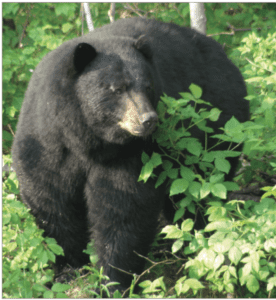By Curt Peterson
The Hartland listserv has been buzzing with bear sightings.
David Cooper, who lives on Mace Hill Road, photographed a wandering ursine on his road July 15 at 5:20 p.m. and posted the image on the listserv.
That inspired Rob Sangster, farther up Mace Hill, to say his composter was “visited” on July 10. That same day, Lorraine, across town on Mt. Hunger Road, sighted a bear, probably the same one seen by Tricia Cornelius on nearby Bal-Hart Ridge Road on July 9 and by Linsi Hylund on Lovers’ Lane on July 11.

Some folks are unnerved by bear visitations, others feel they are part and parcel of living in rural Vermont. Still others tempt fate by feeding bears, or leaving their bird feeders out during times when the lumbering mammals are looking for mates or building up bulk for winter hibernation.
Helen Esmond suggested reporting bear visits on the Vermont Fish and Wildlife website.
Livestock farmers are particularly concerned about the rise in bear-human confrontations. Besides possible economic loss, a farmer’s animals become part of his or her reason for being.
According to a neighbor, Nate Shute suffered loss of a calf inside his barn on Shute Road, and suspected a bear as the perpetrator.
Ryan Smith, wildlife specialist at VF&W, told the Mountain Times otherwise, following investigation by the local game warden. “The cow attack in Hartland recently was confirmed to not likely be a bear — it was not a mature cow, but a small calf, and evidence pointed away from a bear,” Smith wrote. “I saw the pictures and there were no claw marks in evidence — puncture wounds and location of the wounds indicated it was NOT likely a bear.”
According to Smith, chickens are the most common livestock target for bears. “This is very common,” he said, “and increasing.”
He couldn’t cite specific data regarding the number of incidences of bear damage to livestock in the state, but said: “Normally we don’t see predation on cows. We usually can document 2-3 cases annually of bears killing pigs (usually piglets or small hogs), occasionally we get verified attacks by bears on sheep/goats, I believe we have one verified report of a bear killing two sheep this year so far,” he added.
Smith cited a volunteer-performed bear “hazing” program. “Hazing in the bear conflict world means harassing, chasing, basically anything to scare the bear off [using] hounds,” he said. “This practice saves the lives of many bears that would otherwise be killed … in many conflicts (involving) farmers and bears.”




